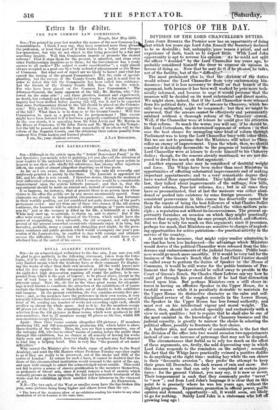TOPICS OF THE DAY.
DIVISION OF THE LORD CHANCELLOR'S DUTIES. LORD JOHN RUSSELL the Preinier now has an opportinity of doing hat which ten years ago Lord John Russell the &cretary deChired to be so desirable ; but, unhappily; turerteason ti• priori, and sad expelienee • of facts, teach us to eXtpedtrtitt16. ' With Lord John oiipartunity is apt, -si reverse his opinion:'" -AS ihelecibld not split theToffices " doubled," by the Lord. Chancellei; tee- . ago, he probably -eonsidered `himself the 'freer' to ,eti...kekil `opinion in favour of doing so:: NOW that Iti raitif:de7 it itlie'reaidirlie-talks; not of the facility; but of thel"di flictiltiffmNia lc' '7 ' favour of doing so:: NOW that Iti raitif:de7 it itlie'reaidirlie-talks; not of the facility; but of thel"di flictiltiffmNia lc' '7 ' The most prominent 'plea, isillthat f-tlierdytif64100 the duties
would. release the Lord Chaneelloefrom ci-cVein. . Mu-
deranges : but it is less -neceS§til.ftti4wellimil df th argument, both hecanse it has. beenWell *Atli" Eli4ledi- nically informed, and because to nrge it2--..aiktilyielituideithati the measure will be decided on its moat shbeitiAtialtitiiilitkiitAiielits. We might show, indeed; that if the Lord,M4n Icenkfiei#Hilased from his political duty, the evil of avrearalintCharelYeiyAiliifilt. !ifs only been mitigated, might he 'tioncitieirefilnlint-theti iihtiiiiitilklfe answered, that the arrears-oat:not he,elffilktlfatifil,ctitagemay intbdned without. it thorotiel-tefortti' etAilie Chaffee/sr.) syitE Well, if the'Chancellor were at-leisurelie' 'ethild give his attest .'.. to that reform. So mach the worse, you will say, 'if he allokilit lk, like Lord Cot -the determined' hpiiiinent of= Afeilli e ' Vila ease the best chalice for sinthvling.Seine kiridlef *i.6fofiiill) Parliament was to keep the .Loitli Chancellor littifWftlAtiVei,
But we arenot to preSume that the Ministers WitirfielebtlAis
eellor an enemy; of improvement. - Trpbt the whole, tlien,_Welidti consider it ',decidedly favotrable to the Prciiiteiis bf httWnietiaifttlie Lord Chancellor were at leisure tb devote hintsalf"Whili diffneery duties; ' though, for the reasons alreigy,itientionek Woille-ricit dis- poied to dwell too much on thatargiiinent,"1 !--'-`. I , Another argument 'also May he tionsitie '-rof 'ktotaftftiN,ity.t and force. The Whigs have-been- richer 1 -i most Ministers' in (opportunities of effecting 'substantial improVementa and Of making important appointments. and to a very remarkable , degree they have wasted 'those opportUnittities. They talked about the Cern- law, they talked about improvements of the iniffi.agelIhtir hills, sanatory reforms, Poor-law reforms, (Sm. ; but in all'I'eaSeS they have so procrastinated, that at last the measure was either aban- doned or pushed into existence by some foreign pressure. ' Their consistent persevertince in -this course has deservedly earned for. them the repute of being the best followers of *hat Charles Buller (and who understood them better ?) called the vid‘-ffieliora prin- ciple ;:a reputation not withoutitsmeonveniehees. The present o portunity furnishes an occasion• on which they might practically correct that repute, by being far once prompt,'decided, and affective. But we fear to rely too much on this argunient; Sind-6 it presumes, perhaps too much, that Ministers are sensitive to charges of Ogled- ing opportunities for active patriotism—for praeticaltMtiVity in the service of the country. .
idon A merit in the measure, that might enjoy readier (tam''S i is one that has been less hackneyed—the advantage which would derive if the political Chancellor were released fro ' the hin-
isal &ranee and embarrassments of the judicial functions.: . ' -obusi- ness would go much more sinoothly. lilt vonid be' iriti I) 'Rik the business of the Queen's Bench that the Chief gititieet"should be called away to perform the duties of Speaker lifithe"House of Commons, it would be still worse for the public business of -Par- liament that the Speaker should -be called away to -preside in the Court of Queen's Bench. Sir .Charles Shaw Lefevre can say how he could get through his present duties' if he had that distraction forced upon him. But perhaps Ministers- own a still closer in- terest in having an effeetive Speaker in the -UpperHouse, for a twofold reason : while it is peculiarly desirable to. 'maintain for the Upper House its distinctive character as the calm and self-. disciplined reviser of the rougher councils in the Lower House, the Speaker in the Upper House hati less formal authority, and must rest on his intellectual vigour and moral weight. The officer, then, should be selected specially and exclusively with a view to such qualities : but to require that he shall also be one of the most eminent in the knowledge of Chancery business and the judicial capacity, is greatly to narrow the choice In selecting the political-officer, possibly to frustrate the best choice.
A further plea, not unworthy of consideration, is the fact that the division of the office into two would occasion two appointments instead of one—an increase of patronage that may not be despised.
The circumstances that forbid us to rely too much on the effect of these arguments, are, firstly, the cold deprecating way in which Lord John responds to the reminders on the subject ;- secondly, the fact that the Whigs have practically evinced a positive dislike to do anything at the right time : making hay while the sun shines is their "favourite aversion " • they prefer the attempt ,to keep their grass till December, the dark season of rain and snow. But this measure is one that can only be completed at certain junc- tures : for the present Cabinet,. you may say, it is now or never. Their temperament is such that they commonly prefer "never" to " now ; and from Lord John's language it is clear that on this point he is precisely where he was ten years ago, without the slightest progress. Experience, promotion in official power, pittlil opinion and demand, opportunity—all, it would seem, are likely_ to go for nothing. Surely Lord John is a statesman who left o growing long ago II


























 Previous page
Previous page